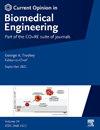Rehabilitation of motor and sensory function using spinal cord stimulation: Recent advances
IF 4.2
3区 工程技术
Q2 ENGINEERING, BIOMEDICAL
引用次数: 0
Abstract
Spinal cord stimulation can improve function in neural injuries and disorders. Here, we review recent developments in epidural and transcutaneous spinal cord stimulation (eSCS, tSCS) for motor and sensory rehabilitation. eSCS entails electrodes implanted epidurally over the dorsal spinal cord, while tSCS utilizes adhesive electrodes placed on the surface of the skin. eSCS and tSCS improve volitional motor control in conditions such as spinal cord injury, Parkinson's disease, stroke, multiple sclerosis, and spinal muscular atrophy. They likely improve volitional function by exciting dorsal root afferents which prime motoneurons for supraspinal and propriospinal inputs. Additionally, eSCS and tSCS evoke sensations in missing limbs post-amputation, providing sensory feedback and improving coordination and stability. Hardware advancements aim to optimize targeting and specificity for motor and sensory rehabilitation applications.
利用脊髓刺激康复运动和感觉功能:最新进展
脊髓刺激可以改善神经损伤和失调的功能。在此,我们回顾了硬膜外脊髓刺激和经皮脊髓刺激(eSCS、tSCS)在运动和感觉康复方面的最新进展。eSCS 需要在脊髓背侧硬膜外植入电极,而 tSCS 则利用皮肤表面的粘合电极。它们可能通过刺激背根传入来改善意志功能,而背根传入会刺激运动神经元以获得脊髓上和本体脊髓的输入。此外,eSCS 和 tSCS 还能唤起截肢后缺失肢体的感觉,提供感觉反馈并改善协调性和稳定性。硬件技术的进步旨在优化运动和感觉康复应用的靶向性和特异性。
本文章由计算机程序翻译,如有差异,请以英文原文为准。
求助全文
约1分钟内获得全文
求助全文
来源期刊

Current Opinion in Biomedical Engineering
Medicine-Medicine (miscellaneous)
CiteScore
8.60
自引率
2.60%
发文量
59
 求助内容:
求助内容: 应助结果提醒方式:
应助结果提醒方式:


